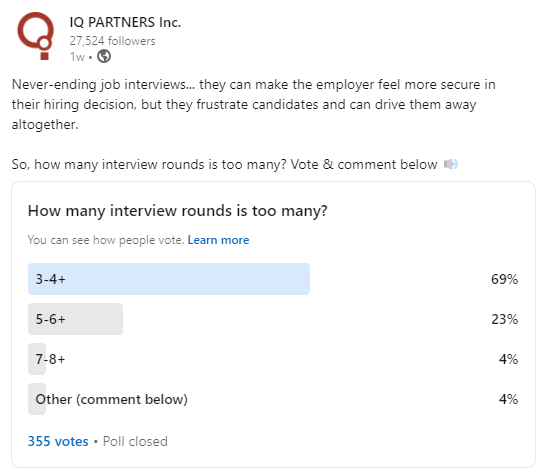Receiving a request for a second job interview is a welcome request. The company you are interviewing with has an interest in you and thinks you could be the right candidate for the job. You have a successful second interview. At this point, you assume an offer may be on the way, but then you get a request for another interview. And then another one after this. It has become common for employers to hold multiple interviews. They want to avoid a hiring mistake and ensure they find the right person.

In the past, it was considered a rare occurrence for a third job interview. Now however, prolonged interview processes can drag out for weeks and even months. This can be a frustrating process for candidates to manage and potentially put the company at risk of losing great talent to competitive offers. When it comes to executive search in Toronto, there is a general belief amongst candidates that you can expect a longer process with more interviews compared to more junior roles. But, there has to be a point of diminishing returns, right?
I hope to share some of my learnings & best practices in this blog. Below, I’ll discuss the results of a recent IQ PARTNERS poll and provide some insights about things to consider about the number of job interviews.
How Many Job Interview Rounds Is Too Many?
The question of how many too many job interviews can be subjective. Depending on who you ask, you will get a different response. As you can see by the recent IQ PARTNERS poll results on LinkedIn, the majority of respondents (69%) believe 3 to 4 interviews are too many. 23% believe 5 to 6 is the limit.
Here are the complete poll results:

What Are The Main Considerations That Determine The Number Of Job Interviews?
Holding two interviews may be the perfect number for your company. Four may work well for different organizations. The number of interviews you choose to hold is dependent on these considerations:
- Level of position: First and foremost there is no exact number that is the right number as it will vary significantly on the level of the position. Junior positions by nature should require fewer interviews and more senior positions will require more.
- The process: The process should be considered from both the employer & prospective employee perspectives. The interview process is not only intended to serve the company hiring to qualify the candidate for skills and fit. It is also for the candidate to evaluate the culture of the company, the scope and responsibility of the position, the fit with the hiring manager and the longer-term career path. As such there are times when moving too fast may not serve the candidate.
- Candidate expectations: An interview process can have many interviews as long as the candidate is made aware of the process and what to expect at the beginning so they can manage their expectations. If additional interviews are deemed to be “added on” a candidate may perceive the company to be dragging its heels or being overly bureaucratic. That same candidate if made aware of those steps at the beginning of the process will have no issue.
- All interviews should add additional value for all: if additional interviews in a process come across as redundant (same people meeting again & covering the same topics), there is little value for either side. Alternatively, if each interview (or maybe more aptly labelled “interaction”) is additive; introducing new people (peers, other departments), a broader exposure to the organization (facility tour, product or service demonstration, etc…), or a different type of interaction (perhaps meeting for coffee or for lunch to be exposure in a less formal or social environment)…all of these will be valuable for both.
- The number of interviews does not equal the length of the process: The number of interviews/interactions does not always have to mean a long process. If you have 5 meetings’ but they are conducted over two weeks that’s reasonable. If they are done over 3.5 months that’s another thing.
What Does Other Research Say About The Right Number of Job Interviews?
According to research curated by Forbes.com most job seekers think that two interviews should be the max, whereas hiring managers say to expect at least two. So, there is a clear disconnect between expectations for the number of job interviews:
- 83% believe more than one interview is appropriate. 41% say two should be the maximum number of interviews
- 40% of hiring managers say job seekers should expect two interviews or more. 15% say five or more is the norm at their company
Potential Negatives of Extended Job Interview Processes
The same research looked at the potential issues with multiple job interviews. They are:
- Adding more time to the process (52%)
- Causing delays in a candidate getting a job (45%)
- Additional costs related to a job search (39%)
- The risk of losing a candidate to another job offer (32%)
- Candidates becoming fatigued with the process (27%)
Is There A Better Alternative To More Than Two Interviews?
There are some alternatives to holding more than two interviews. For example, companies could hold panel interviews over interviewing with 5 different people. You could also use pre-qualification assignments or tests to reduce the number of interviews.
Are Too Many Interviews A Red Flag?
Too many interviews could be a red flag. Employers conducting over five rounds of interviews often indicate uncertainty about their hiring needs. If a company remains undecided on a candidate after multiple rounds, it signals a flawed hiring process or potential internal issues.
Is It Normal To Have 5 Interviews For A Job?
It has become increasingly common for companies to hold more than two interviews. However, five interviews are still considered to be on the high end. 5 Interviews would be more common for executive roles.
In Summary: There Isn’t A Perfect Number Of Job Interviews
Like all things in life, it’s not a one-size-fits-all answer to how many interviews a company should hold. Generally, the seniority of the position will make a big difference in terms of the number of interviews (or maybe engagements/interactions) required.
You can have as many interviews as required as long as you ensure the following:
- Expectations are made clear at the beginning of the process: If the candidate knows that there will be 5 interviews, they can manage expectations.
- Ensure that each step is additive to the process for both parties: New people being introduced, broader exposure, different types of interactions, etc.

More About Job interviews From Our Executive Search Team
4 Things You Should Never Hear in a Job Interview
7 Phrases That Are Interview Killers
How to Respond to the Dreaded “Tell Me About Yourself” in an Interview
How to Ace a Second Interview: 8 Tips from an Executive Search Firm




